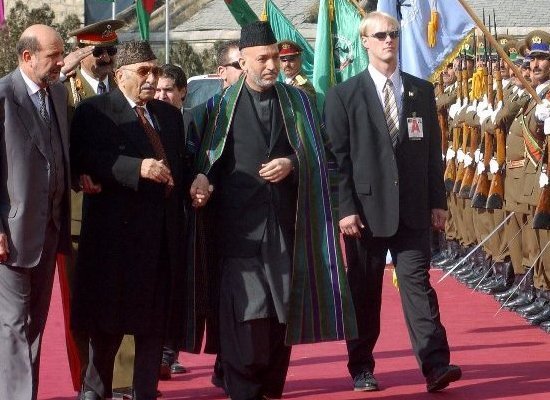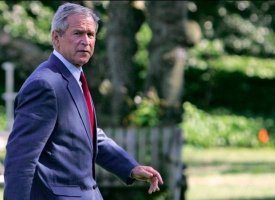When Crown Publishing inked a deal with George W. Bush for his memoirs, the publisher knew it wasn't getting Faulkner. But the book, at least, promises "gripping, never-before-heard detail" about the former president's key decisions, offering to bring readers "aboard Air Force One on 9/11, in the hours after America's most devastating attack since Pearl Harbor; at the head of the table in the Situation Room in the moments before launching the war in Iraq," and other undisclosed and weighty locations.
Crown also got a mash-up of worn-out anecdotes from previously published memoirs written by his subordinates, from which Bush lifts quotes word for word, passing them off as his own recollections. He took equal license in lifting from nonfiction books about his presidency or newspaper or magazine articles from the time. Far from shedding light on how the president approached the crucial "decision points" of his presidency, the clip jobs illuminate something shallower and less surprising about Bush's character: He's too lazy to write his own memoir.
Bush, on his book tour, makes much of the fact that he largely wrote the book himself, guffawing that critics who suspected he didn't know how to read are now getting a comeuppance. Not only does Bush know how to read, it turns out, he knows how to Google, too. Or his assistant does. Bush notes in his acknowledgments that "[m]uch of the research for this book was conducted by the brilliant and tireless Peter Rough. Peter spent the past 18 months digging through archives, searching the internet[s], and sifting through reams of paper." Bush also collaborated on the book with his former speechwriter, Christopher Michel.
Many of Bush's literary misdemeanors exemplify pedestrian sloth, but others are higher crimes against the craft of memoir. In one prime instance, Bush relates a poignant meeting between Afghan President Hamid Karzai and a Tajik warlord on Karzai's Inauguration Day. It's the kind of scene that offers a glimpse of a hopeful future for the beleaguered nation. Witnessing such an exchange could color a president's outlook, could explain perhaps Bush's more optimistic outlook and give insight into his future decisions. Except Bush didn't witness it. Because, as he himself writes later in the book, he wasn't at Karzai's inauguration.
His absence doesn't stop Bush from relating this anecdote: "When Karzai arrived in Kabul for his inauguration on December 22 - 102 days after 9/11 - several Northern Alliance leaders and their bodyguards greeted him at an airport. As Karzai walked across the tarmac alone, a stunned Tajik warlord asked where all his men were. Karzai, responded, 'Why, General, you are my men. All of you who are Afghans are my men.'"
That meeting would sound familiar to Ahmed Rashid, author of "The Mess in Afghanistan", who wrote in the New York Review of Books: "At the airport to receive [Karzai] was the warlord General Mohammad Fahim, a Tajik from the Panjshir Valley .... As the two men shook hands on the tarmac, Fahim looked confused. 'Where are your men?' he asked. Karzai turned to him in his disarmingly gentle manner of speaking. 'Why General," he replied, "you are my men--all of you are Afghans and are my men.'"
Bush's lifting of the anecdote, while disappointing on a literary level, does raise the intriguing possibility that Bush actually read Rashid's article. Doubtful. It was excerpted in the Googleable free intro to his NYRB story. (Still, thinking of Bush browsing the NYRB's website almost makes it worthwhile.)
In a separate case of scene fabrication, though, Bush writes of a comment made by his rival John McCain as if it was said to him directly. "The surge gave [McCain] a chance to create distance between us, but he didn't take it. He had been a longtime advocate of more troops in Iraq, and he supported the new strategy wholeheartedly. "I cannot guarantee success," he said, "But I can guarantee failure if we don't adopt this new strategy." A dramatic and untold coming-together of longtime rivals? Well, not so much. It comes straight from a Washington Post story. McCain was talking to reporters, not to Bush.
In most instances of Bush's literary swiping, he was at least present for the scene. But the point of a memoir is that it is the author's version of events. Bush's book is a collection of other people's versions of events. But that's not what Bush promises readers. "Decision Points is based primarily on my recollections. With help from researchers, I have confirmed my account with government documents, personal interviews, news reports, and other sources, some of which remain classified," he offers. Bush, in his memoir, confesses to authorizing waterboarding, which is a war crime, so the lifting of a few passages might seem like a minor infraction. But Bush's laziness undermines the historical value of the memoir. Bush "recollects" - in a more literal sense of the term - quotes by pulling his and others verbatim from other books, calling into question what he genuinely remembers from the time and casting doubt on any conclusions he draws about what his mindset was at the time.
George Bush Book 'Decision Points' Lifted From Advisers' Books
When Crown Publishing inked a deal with George W. Bush for his memoirs, the publisher knew it wasn't getting Faulkner. But the book, at least, promises "gripping, never-before-heard detail" about the former president's key decisions, offering to bring readers "aboard Air Force One on 9/11, in the hours after America's most devastating attack since Pearl Harbor; at the head of the table in the Situation Room in the moments before launching the war in Iraq," and other undisclosed and weighty locations.
Crown also got a mash-up of worn-out anecdotes from previously published memoirs written by his subordinates, from which Bush lifts quotes word for word, passing them off as his own recollections. He took equal license in lifting from nonfiction books about his presidency or newspaper or magazine articles from the time. Far from shedding light on how the president approached the crucial "decision points" of his presidency, the clip jobs illuminate something shallower and less surprising about Bush's character: He's too lazy to write his own memoir.
Bush, on his book tour, makes much of the fact that he largely wrote the book himself, guffawing that critics who suspected he didn't know how to read are now getting a comeuppance. Not only does Bush know how to read, it turns out, he knows how to Google, too. Or his assistant does. Bush notes in his acknowledgments that "[m]uch of the research for this book was conducted by the brilliant and tireless Peter Rough. Peter spent the past 18 months digging through archives, searching the internet[s], and sifting through reams of paper." Bush also collaborated on the book with his former speechwriter, Christopher Michel.
Many of Bush's literary misdemeanors exemplify pedestrian sloth, but others are higher crimes against the craft of memoir. In one prime instance, Bush relates a poignant meeting between Afghan President Hamid Karzai and a Tajik warlord on Karzai's Inauguration Day. It's the kind of scene that offers a glimpse of a hopeful future for the beleaguered nation. Witnessing such an exchange could color a president's outlook, could explain perhaps Bush's more optimistic outlook and give insight into his future decisions. Except Bush didn't witness it. Because, as he himself writes later in the book, he wasn't at Karzai's inauguration.
His absence doesn't stop Bush from relating this anecdote: "When Karzai arrived in Kabul for his inauguration on December 22 - 102 days after 9/11 - several Northern Alliance leaders and their bodyguards greeted him at an airport. As Karzai walked across the tarmac alone, a stunned Tajik warlord asked where all his men were. Karzai, responded, 'Why, General, you are my men. All of you who are Afghans are my men.'"
That meeting would sound familiar to Ahmed Rashid, author of "The Mess in Afghanistan", who wrote in the New York Review of Books: "At the airport to receive [Karzai] was the warlord General Mohammad Fahim, a Tajik from the Panjshir Valley .... As the two men shook hands on the tarmac, Fahim looked confused. 'Where are your men?' he asked. Karzai turned to him in his disarmingly gentle manner of speaking. 'Why General," he replied, "you are my men--all of you are Afghans and are my men.'"
Bush's lifting of the anecdote, while disappointing on a literary level, does raise the intriguing possibility that Bush actually read Rashid's article. Doubtful. It was excerpted in the Googleable free intro to his NYRB story. (Still, thinking of Bush browsing the NYRB's website almost makes it worthwhile.)
In a separate case of scene fabrication, though, Bush writes of a comment made by his rival John McCain as if it was said to him directly. "The surge gave [McCain] a chance to create distance between us, but he didn't take it. He had been a longtime advocate of more troops in Iraq, and he supported the new strategy wholeheartedly. "I cannot guarantee success," he said, "But I can guarantee failure if we don't adopt this new strategy." A dramatic and untold coming-together of longtime rivals? Well, not so much. It comes straight from a Washington Post story. McCain was talking to reporters, not to Bush.
In most instances of Bush's literary swiping, he was at least present for the scene. But the point of a memoir is that it is the author's version of events. Bush's book is a collection of other people's versions of events. But that's not what Bush promises readers. "Decision Points is based primarily on my recollections. With help from researchers, I have confirmed my account with government documents, personal interviews, news reports, and other sources, some of which remain classified," he offers. Bush, in his memoir, confesses to authorizing waterboarding, which is a war crime, so the lifting of a few passages might seem like a minor infraction. But Bush's laziness undermines the historical value of the memoir. Bush "recollects" - in a more literal sense of the term - quotes by pulling his and others verbatim from other books, calling into question what he genuinely remembers from the time and casting doubt on any conclusions he draws about what his mindset was at the time.
In a final irony, Bush appears to draw heavily from several of Bob Woodward's books and also from Robert Draper's "Dead Certain". The Bush White House called the books' accuracy into question when they were initially published.
The similarities between the way Bush recollects his and other quotes may be a case of remarkable random chance or evidence that he and his deputies were in an almost supernatural sync. If so, he essentially shares a brain with General Tommy Franks.
Bush writes: "Tommy told the national security team that he was working to apply the same concept of a light footprint to Iraq... 'If we have multiple, highly skilled Special Operations forces identifying targets for precision-guided munitions, we will need fewer conventional grounds forces,' he said. 'That's an important lesson learned from Afghanistan.' I had a lot of concerns. ... I asked the team to keep working on the plan. 'We should remain optimistic that diplomacy and international pressure will succeed in disarming the regime,' I said at the end of the meeting. 'But we cannot allow weapons of mass destruction to fall into the hands of terrorists. I will not allow that to happen.'"
Franks, in his memoir American Soldier, writes: "'For example, if we have multiple, highly skilled Special Operations forces identifying targets for precision-guided munitions, we will need fewer conventional ground forces. That's an important lesson learned from Afghanistan.' President Bush's questions continued throughout the briefing.... Before the VTC ended, President Bush addressed us all. 'We should remain optimistic that diplomacy and international pressure will succeed in disarming the regime.' ... The President paused. 'Protecting the security of the United States is my responsibility,' he continued. 'But we cannot allow weapons of mass destruction to fall into the hands of terrorists.' He shook his head. 'I will not allow that to happen.'"
A Crown official rejected the suggestion that Bush had done anything inappropriate, suggesting that the similarities speak to its inherent accuracy. The editor of Bush's book wasn't immediately able to comment.
But if you already bought Bush's book thinking you were getting only his own thoughts, you haven't entirely wasted your money. Finding lifted passages in Bush's book is like an Easter egg hunt. Look for passages with a number of quotes back to back and then slap the passage into Google Books or plagiarism detection software you might have access to. The slideshow below shows what HuffPost has found so far. If you find any more, send the passage to ryan@huffingtonpost.com and we'll verify it and add it to the list.

From Ahmed Rashid’s The Mess in Afghanistan, quoted in The New York Times Review of Books: “At the airport to receive [Karzai] was the warlord General Mohammad Fahim, a Tajik from the Panjshir Valley …. As the two men shook hands on the tarmac, Fahim looked confused. 'Where are your men?' he asked. Karzai turned to him in his disarmingly gentle manner of speaking. 'Why General,' he replied, “you are my men—all of you are Afghans and are my men...'"
Bush was not at Karzai’s Innauguration.





First Posted: 11-12-10 01:48 PM | Updated: 11-13-10 12:27 PM